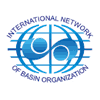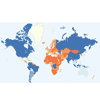



Regional organizations

International Fund for the Aral Sea Saving
The main task of the Fund is the financing and crediting of joint practical actions and perspective programs and projects for the Aral sea saving, ecological rehabilitation of Pryaralye and of the Aral Sea Basin as à whole with account of the interests of all the states of the region.
The founders of the Fund are the Republic of Kazakhstan, Kyrgyz Republic, the Republic of Tajikistan, Turkmenistan and the Republic of Uzbekistan.
The Executive Committee of IFAS
The Executive Committee of IFAS is a permanent body of the Fund and is created by the decision of the President of the Fund,and located on the basis of rotation in the country presiding in the Fund. The IFAS Executive Committee consists of 10 members – two representatives from each of the founding countries. The IFAS Executive Committee is managed by the Chairman, who is appointed by the President of the Fund in agreement with the Heads of the founding states.
The main tasks of the IFAS Executive Committee are:
- practical implementation of decisions of the Heads of State;
- implementation of relevant projects and programs of the Aral Sea basin;
- coordination of the branches activities in the territory of the founding states;
- promotion of ICWC and ICSD activites;
- cooperation with international organizations, donor countries, environmental and other funds to enhance activities to address environmental issues;
- attract the funds for project and program management;
- preparation of documents and meetings of the IFAS Board, as well as conferences and meetings of the Heads of State on the problems of the Aral Sea.
Executive Administration of EC IFAS in the Republic of Kazakhstan
Executive Administration of the International Fund for Saving the Aral Sea in the Republic of Kazakhstan (IFAS EA) is an international organization aimed at solving problems in the Kazakh part of the Aral Sea basin and Prearalie and striving for positive changes in life of communities in Prearalie by improving economic and social conditions. IFAS EA facilitates implementation of projects on water, environment, and socio-economic development. In its efforts, it relies on experience of its staff and wide range of partners.
According to the Regulations on IFAS EA in the Republic of Kazakhstan, its main tasks are ensuring practical implementation of decisions made by the Council of Central Asian states heads, IFAS President, Executive Board, and Executive Committee related to the Kazakh part of the Aral Sea basin, implementing and monitoring projects and programs funded by republic and donor-countries, raising funds of donor-countries and international organizations to finance programs and projects on the rehabilitation of the Aral Sea basin, and preparing information materials for authorities of the republic and members of IFAS Executive Board from Kazakhstan and IFAS Executive Committee.
EC IFAS Branch in the Republic of Tajikistan
Branch of EC IFAS in Tajikistan
ASBP Projects Implementation Agency in the Republic of Uzbekistan
Agency of the International Fund for Saving the Aral Sea for implementation of the Aral Sea Basin and GEF projects (GEF Agency of IFAS) is a working body of the International Fund for Saving the Aral Sea. The Agency is entrusted with practical management and implementation of projects on problems in the Aral Sea basin, coordination and attraction of funds, control and establishment of contracts, organization of procurements, and recruitment of companies, firms, individuals, and legal entities to implement projects, their components, sub-components, and specific activities for the benefit of all Central Asian countries in full compliance with the Regulations on IFAS Executive Committee.
Regional Center of Hydrology in Central Asia
Goals and objectives of the RCH
- Implementation of solutions on the Aral Sea made by the IFAS Board;
- Improvement of the hydrological forecasting and data exchange between the NHMSs and the strengthening of regional cooperation;
- Implementation of measures to create a network for hydro-meteorological monitoring (stations, posts);
- Increased collaboration with international organizations, donor countries and other funds.
Interstate Commission for Water Coordination of Central Asia
ICWC is a regional body of the Central Asian states to deal with joint solution of issues related to shared water management, effective use and protection in the Aral Sea basin and to implement of commonly elaborated programs following the principles of collectivity and mutual respect of parties’ interests.
Statute of the Interstate Commission for Water Coordination of Central Asia
Scientific-Information Center of ICWC
SIC ICWC is an information and analytical body, which develops methods and approaches of prospective development, improvement of water management and ecological situation in the basin.
Statute of the Scientific-Information Center of ICWC
SIC ICWC is collaborating with a network of scientific and design organizations of the five countries of Central Asia, has national branches in three countries which, in turn, organize scientific and information exchange at the national level.
Statute on SIC ICWC branches in the Aral Sea basin states
Basin Water Organization “Amudarya”
www.cawater-info.net/amudarya/
Basin Water Organization “Amudarya” is an executive and interdepartmental control body of Interstate Commission for Water Coordination of Central Asia. BWO “Amudarya” provides water resources within ICWC established limits in the Amudarya river basin. It operates water-intakes, hydropowers, reservoirs of common use, interstate canals under strict observance to nature protection requirements and implementing measures on ecological situation improvement.
Basin Water Organization “Syrdarya”
www.cawater-info.net/syrdarya/
Basin Water Organization “Syrdarya” is an executive and interdepartmental control body of Interstate Commission for Water Coordination of Central Asia. BWO “Syrdarya” provides water resources within ICWC established limits in the Syrdarya river basin. It operates water-intakes, hydropowers, reservoirs of common use, interstate canals under strict observance to nature protection requirements and implementing measures on ecological situation improvement.
Proceeding from the 21st ICWC meeting, a Training center for capacity building in the Central Asian water sector was established at SIC ICWC. Along with raising the level of professional knowledge, the training contributes to cooperation among the riparian countries in the field of water use and management and elaboration of common approaches at the level of water specialists and decision makers.
www.icwc-aral.uz/secretariat.htm 
The Secretariat is responsible for:
- organizing fulfilling commissions from ICWC;
- preparing programs, measures and draft decisions at ICWC meetings together with BWO “Syrdarya” and BWO “Amudarya”;
- drawing up cost estimates of operation and capital construction for financing BWO “Syrdarya” and BWO “Amudarya” at the expense of ICWC Member States;
- accounting and reporting on fulfilling plan for operation and capital construction;
- controlling receipt of money from ICWC Member States designed for BWO “Syrdarya” and BWO “Amudarya” for operation, capital construction, and other activities to be carried out this year;
- coordinating international relations.
Interstate Commission on Sustainable Development
The prime objective of the Interstate Commission for Sustainable Development (ICSD) is coordinating and organizing regional cooperation in the area of environmental protection and sustainable development in Central Asia.
Mission:
- Organization and coordination of activity for elaboration of regional sustainable development strategy, programs, and plans.
- Management of regional environmental and sustainable development programs, action plans, and projects.
- Preparation and expertise of regional projects.
- Coordination of actions related to fulfillment by the Central Asian countries of environmental conventions of transboundary nature.
- Contributing to harmonization of environmental legal and procedural frameworks.
- Promotion of interstate exchange of information and development of regional environmental and sustainable development information bank.
Scientific-Information Center ICSD
The Scientific-Information Center is an executive body of ICSD. SIC ICSD is charged with the following functions:
- collect, process, and generalize data and scientific information about environmental and socio-economic conditions in the Aral Sea basin;
- create a common scientific information base and databank on environmental protection and rational nature management in the Aral Sea basin;
- prepare recommendations in support of research, environmental, and socio-economic cooperation with the ultimate aim to address relevant challenges in the Aral Sea region;
- support issue of a bulletin and provision of national entities with information on scientific and technological advancements and best practices;
- elaborate a concept and program for the unified environmental monitoring system in the Aral Sea basin;
- develop the common methodological base for environmental and economic assessments of natural resources and nature management projects in the Aral Sea basin;
- develop basic environmental principles, indicators, and criteria for adoption by the Central Asian states and their incorporation into relevant legislative acts.
Tajik Branch of the Scientific-Information Center ICSD
One focus area of the Tajik branch of SIC ICSD is the generation of environmental and sustainable development data support system.
Secretariat ICSD
Secretariat is an executive body of ICSD. Secretariat is charged with the following functions:
- prepare and disseminate documents and papers about ICSD events;
- arrange preparations for ICSD meetings and other events as decided by ICSD;
- support interaction between ICSD bodies;
- draw up ICSD reporting;
- fulfill assignments of the ICSD Chairman.
Regional Mountain Center of Central Asia
Goal of the RMCCA is to promote cooperation of the CA states on conservation of the mountain ecosystems, sustainable use of their natural resources and improving social and economic conditions of the population living in mountain regions including provision of scientific and informational support and training for specialists.
Central Asian Regional Center on Renewable Energy Sources (CARC RES)
The Central Asian Regional Center on Renewable Energy Sources is aimed at facilitating coordinated actions on implementation of the environmentally friendly energy sources in economic and other sectors in Central Asia by joining scientific and technical capacity and experience of the countries.
Commission of the Republic of Kazakhstan and the Kyrgyz Republic on the Use of Water Management Facilities of Intergovernmental Status on the Rivers Chu and Talas.
Global Water Partnership Caucasus and Central Asia
The Global Water Partnership (GWP) was established in 1996 in response to the call during the 1992 UN Conference on Environment and Development (UNCED) in Rio de Janeiro to manage water resources sustainably, in accordance with the Dublin principles, to resolve current and future water crises. The GWP does this through promoting a holistic, participatory and cross-sectoral approach to water management known as integrated water resources management.
The mission of the Global Water Partnership Caucasus and Central Asia (GWP CACENA) is to support CACENA countries in the sustainable management of their water resources.
Statute for the Global Water Partnership Network and the Global Water Partnership Organisation
Regional Environmental Centre for Central Asia
Regional Environmental Centre for Central Asia (CAREC) Mission is promote multi-sector cooperation in addressing environmental problems in Central Asia at the local, national and regional levels.
The United Nations Regional Centre for Preventive Diplomacy for Central Asia
The goal of the United Nations Regional Centre for Preventive Diplomacy for Central Asia is to assist and support the governments of Kazakhstan, Kyrgyzstan, Tajikistan, Turkmenistan and Uzbekistan in building their conflict prevention capacities through enhanced dialogue, confidence building measures and establishing genuine partnership in order to respond to existing threats and emerging challenges in the Central Asian region.
UN Economic Commission for Europe
UNECE as a multilateral platform facilitates greater economic integration and cooperation among its fifty-six member States and promotes sustainable development and economic prosperity through:
- policy dialogue,
- negotiation of international legal instruments,
- development of regulations and norms,
- exchange and application of best practices as well as economic and technical expertise,
- technical cooperation for countries with economies in transition.
The UNECE contributes to enhancing the effectiveness of the UN through the regional implementation of outcomes of global UN Conferences and Summits. Its terms of reference have been defined by ECOSOC.
Terms of Reference and Rules of Procedure of the Economic Commission for Europe
The International Water Assessment Center
The International Water Assessment Center (IWAC) is the subsidiary joint body of the Convention on the Protection and Use of Transboundary Watercourses and International Lakes (hereinafter referred to as the Convention).
IWAC will:
- provide scientific, methodological and technical support to national governments for the implementation of the provisions of the Convention;
- assist countries to introduce best practices, including through pilot projects on transboundary waters;
- assist Parties to the Convention with an economy in transition through the organization of seminars and workshops on the exchange of information on best available technologies, on the results of research and development, on training related to monitoring and assessment of the state of water resources;
- assist to the Parties to the Convention in the preparation of reports on the status of transboundary waters, including on the basis of general regional information, as well as in the development and maintenance of relevant databases.
In carrying out its activities, IWAC shall abide with the principles of neutrality and cooperation, in the best interests of the Convention, in order to safeguard credibility, independence and objectivity
IWAC will have a special focus on Kazakhstan’s neighboring countries, other Central Asian countries, as well as other countries inside and outside the UNECE region, as appropriate.
United Nations Development Programme
UNDP works in more than 170 countries and territories, helping to achieve the eradication of poverty, and the reduction of inequalities and exclusion. UNDP helps countries to develop policies, leadership skills, partnering abilities, institutional capabilities and build resilience in order to sustain development results.
UNDP’s mandate has four pillars: poverty reduction and the mdgs; democratic governance; crisisprevention and recovery; and environment and sustainable development.
United Nations Environment Programme
The United Nations Environment Programme (UNEP) is the leading global environmental authority that sets the global environmental agenda, promotes the coherent implementation of the environmental dimension of sustainable development within the United Nations system and serves as an authoritative advocate for the global environment.
UNEP work encompasses:
- Assessing global, regional and national environmental conditions and trends
- Developing international and national environmental instruments
- Strengthening institutions for the wise management of the environment
The UN Multi-Partner Human Security Trust Fund for the Aral Sea region
The UN Multi-Partner Human Security Trust Fund for the Aral Sea region is a unique single platform for uniting international donors communities’ efforts and mobilization of their resources within the assistance framework to the Aral Sea region by implementing complex of measures directed towards improvement of the ecological and socio-economic situation in the Aral Sea region through the prism human security concept.
National organizations

National organizations in the field of natural resources management and use and the environmental protection
International organizations and processes

International water organizations
This section is dedicated to international non-governmental organizations with a view to wider involvement of Russian-speaking audience in their activities.
Web site of preparation process of Central Asia and its paricipation in the World Water Fora.

GWANET — Gender and Water in Central Asia
Network “GWANET — Gender and Water in Central Asia”: improves gender awareness among the water sector stakeholders at regional, national and local levels, and strengthen their capacity in incorporating gender issues into the decision-making process.

Expert Platform on Water Security, Sustainable Development and Future Studies
The Expert Platform serves as a community of experts that conduct interdisciplinary research on water security, sustainable development, and future studies in Eastern Europe, the Caucasus and Central Asia and adjacent regions.
The Expert Platform seeks to fill the gap in an integrated approach and expertise rather than replace or duplicate the activities of existing institutions.

The Network of EECCA Water Management Organisations
The Network of EECCA Water Management Organisations is established to exchange views, experiences, and information on various aspects of water-management activity.
Review of developments in the countries

Water Yearbook: Central Asia and around the Globe
Section includes water related highlights of year.
Databases

The database “Water Atlas” contains information on the water-management and environmental organizations.

International River Basins of the World
Register which lists 261 international rivers, covering 45.3% of the land-surface of the Earth

International River Basin Organizations
International River Basin Organizations est. 1815-2002

Environmental NGOs of Central Asia
Data provided by CAREC (in Russian)
